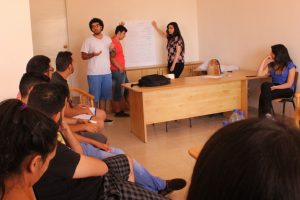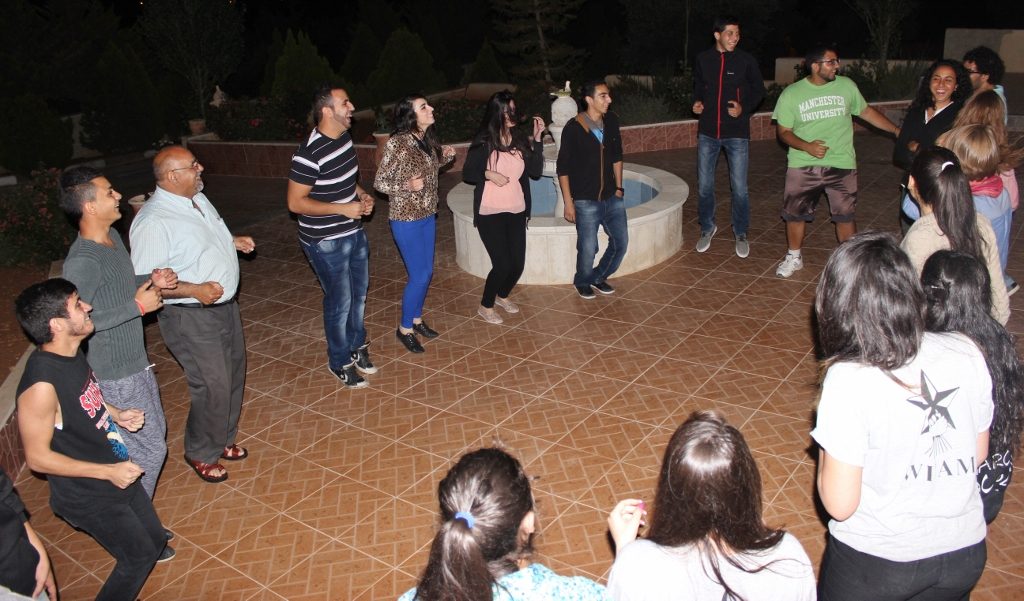The Wi’am Youth Program continues to grow and reach out to young people (ages 18-30) in Palestine, as well as in international arenas. Whether it be through international youth exchanges, social activism, non-violence training, or voluntary service, it is clear that young people are hungry for opportunities to learn and are eager to creatively give back to their communities. Through weekly meetings and workshops, Wi’am provides opportunities to discuss and learn about topics such as  Non-Violence, Democracy, Human Rights, Dialogues of Cultures and Religions, Gender Issues, Civil Society Empowerment, Advocacy, International Perspectives, Regional and Global Issues, Justice, Reconciliation, and Intercommunity Relationships. The youth often conduct these meetings themselves, and Wi’am encourages them to initiate and conduct trainings within civil society. Though Wi’am provides them with a wealth of information, they are also learning to appreciate their own strengths.
Non-Violence, Democracy, Human Rights, Dialogues of Cultures and Religions, Gender Issues, Civil Society Empowerment, Advocacy, International Perspectives, Regional and Global Issues, Justice, Reconciliation, and Intercommunity Relationships. The youth often conduct these meetings themselves, and Wi’am encourages them to initiate and conduct trainings within civil society. Though Wi’am provides them with a wealth of information, they are also learning to appreciate their own strengths.
We host weekly meetings that act as training opportunities, a space to discuss issues they face in their everyday lives, or a time to celebrate accomplishments. The assistance Wi’am provides strengthens our youth professionally while reinforcing their roles in the community. Many have been accepted to attend graduate schools both locally and abroad, and they are making great strides forward in their careers.
Exchange Programs
Through Wi’am’s connections with agencies such as the International Fellowship of Reconciliation and Women Waging Peace, several of our youth have been able to spend extended time abroad, to both study and volunteer. Our youth have worked on women’s issues in Holland, explored conflict transformation at universities in the United States, and provided humanitarian aid work locally and after several devastating hurricanes in the United States. Wi’am’s connections with other groups like Euro-Med and the World Council of Churches have enabled us to send teams of youth on cultural exchange opportunities. Those countries have included France, Germany, Italy, Brazil, Sweden, South Korea, Holland, Morocco, Macedonia, South Africa, The Maldives, Malta, Canada, Switzerland, Ireland, Belgium, Tunisia, Bulgaria, Turkey, Austria, Japan, Hungary, Lebanon, Egypt, and the United Kingdom. Upon returning to Palestine, the youth are eager to share their stories, pictures, lessons learned and challenges overcome.
Just as we are able to send our youth abroad, we are also able to host cultural exchanges, with youth groups from the United States, England, Denmark, Scotland, Korea and other nations to discuss non-violence, peacebuilding, religion as a tool of peace, and intra-cultural exchange. Whether experienced abroad or locally, these youth exchanges provide a safe environment in which young people learn more about themselves, as well as their peers in other cultures. They learn how to speak about the complex realities of living in Palestine and growing up Palestinian, and they are given the chance to clarify international misconceptions about Palestinians.
Youth exchange and understanding is important not just outside of Palestine, but between Palestinian youth as well. We bring together youth from Bethlehem, Ramallah and Jerusalem, allowing them to find many things in common with, as well as differences from, their peers. Although they all live within a 20-mile radius, each faces a common struggle against Occupation, but in ways that are specific to each one’s geographic area.
A Learning Space for University Programs
Several universities in Palestine, including Bethlehem University, Al-Quds University, and Ahliya University send their students to work for Wi’am to demonstrate their commitment to community service. These interns both assist in the continuous work of Wi’am as well as focus on service related to their individual academic fields.
Contributions to the Community
Aside from exchange activities, our youth are actively contributing to the development and progress of their local community. The youth are an integral part of the work we do through our Children’s program, from leading activities to being positive role models for our youngest generation. They also assist with other tasks around the office, and are active in the Sulha program. Whether they accompany caseworkers to mediate and resolve conflicts, or contribute to such transformation themselves, these youth are helping to heal hurts and rifts in society. This work is invaluable.

